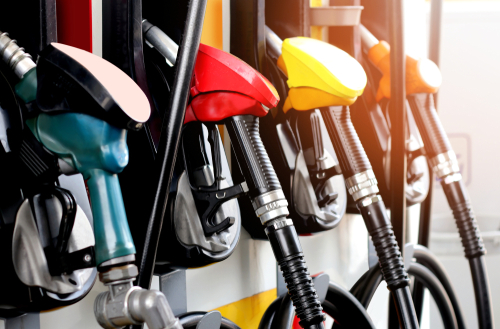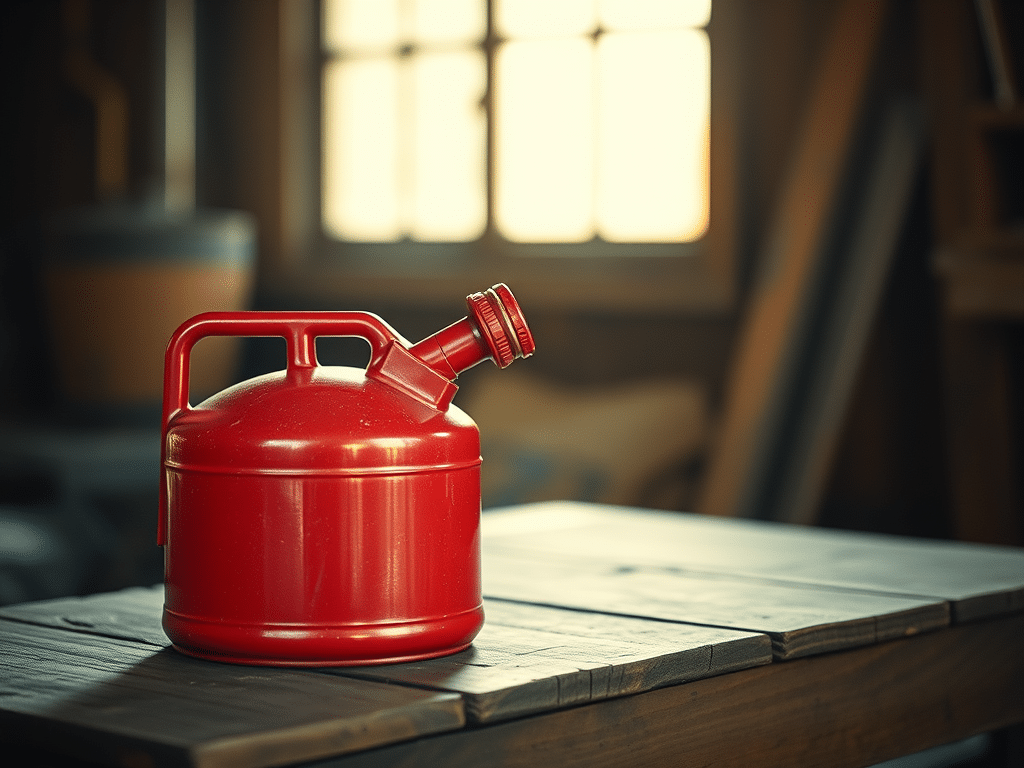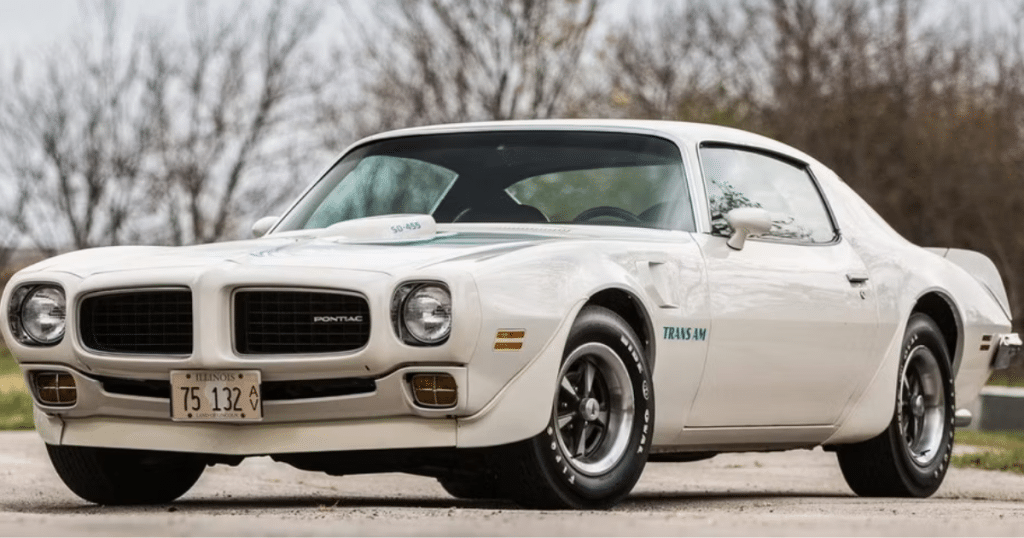Got an old can of gas sitting in your garage? Don’t let it go to waste or create a hazard.
Disposing of old gasoline properly is crucial for safety and environmental reasons.
Let’s dive into the best ways to handle that stale fuel.

The safest way to dispose of old gasoline is to take it to a hazardous waste collection site in your area.
These facilities are equipped to handle flammable materials and ensure they’re processed without harming the environment.
But before you load up that rusty can, there are a few things you should know.
Did you know that gasoline can actually go bad? It’s true!
Over time, gas breaks down and can gum up your engine.
But don’t worry, we’ll cover how to tell if your gas has gone off and what to do with it.
Stick around, and you’ll be a pro at handling old gas in no time.
Key Takeaways
- Always dispose of old gasoline at a designated hazardous waste collection site
- Gasoline can degrade over time, potentially damaging engines if used
- Proper storage and handling of gasoline is essential for safety and longevity
Understanding Gasoline and Its Lifespan
Gasoline doesn’t last forever, folks. It’s like that carton of milk in your fridge – it has an expiration date.
Let’s dive into the world of old gas and learn how to spot the bad stuff.
What Is Old Gas?

You might think gas is gas, right? Wrong-o! Pure gasoline typically lasts between 3 and 6 months. Ethanol-blended gas? Even shorter – about 3 months tops.
But here’s the kicker: the gas you pump might already be a few weeks old. Sneaky, huh?
So what happens when gas gets old? It starts to break down, losing its oomph.
Your engine might sputter, misfire, or refuse to start altogether. Not fun when you’re running late for work!
Recognizing Bad Gasoline
Now, how do you spot this troublemaker? Your nose knows!
Old gas has a sour smell, like rotten eggs had a party in your gas tank.
Look for these signs:
- Darker color (think murky swamp water)
- Separating layers (like a bad cocktail)
- Gummy deposits (yuck!)
If you’re brave enough to start the engine, listen for:
- Sputtering
- Rough idling
- Stalling
Don’t ignore these warning signs! Bad gas can clog your fuel system faster than your arteries after a greasy burger binge.
Time to consider a fuel additive or stabilizer to keep your gas fresh and your engine happy!
Safety First: The Basics of Flammability and Hazards

Hazards of Old Gasoline
Your old gas isn’t just stinky; it’s downright dangerous.
As gasoline ages, it becomes more unstable and can ignite at lower temperatures.
That’s right, it’s like a grumpy old man – more likely to blow up at any moment.
Vapors are the real troublemakers here. They can travel to ignition sources and cause fires or explosions faster than you can say “oops.”
And don’t forget, gasoline is toxic. Breathing in those fumes can make you dizzy, nauseous, or worse.
Old gas can also gum up your engine like last week’s oatmeal.
It’s classified as hazardous waste, so you can’t just dump it down the drain or in your backyard.
That’s a big no-no, and Mother Nature won’t thank you for it.
Proper Storage and Handling
When it comes to storing gas, think of it like a temperamental toddler – it needs the right container and environment.
Always use an approved container for gasoline storage.
These are usually red, clearly marked, and have a tight-fitting cap.
Store your gas in a cool, dry place away from your living areas. Your garage or a separate shed is perfect.
Just make sure it’s out of reach of kids, pets, and your nosy neighbor who likes to “borrow” things.
Never, and I mean never, store gas near heat sources or in direct sunlight.
That’s like putting a cat in a room full of catnip – trouble’s bound to happen.
And please, for the love of all things automotive, don’t smoke around gasoline.
That’s a disaster waiting to happen, folks.
When handling old gas, wear gloves and work in a well-ventilated area.
If you spill some, clean it up immediately with absorbent materials like kitty litter or sand.
It’s not the time to cry over spilled gas, but it is time to clean it up pronto!
The Right Way to Dispose of Old Gas
Disposing of old gas safely is crucial for protecting the environment and complying with regulations.
You’ll need to use the right containers and find the proper disposal facilities to get rid of that stale fuel hanging around your garage.
Approved Containers for Disposal
When it comes to old gas, you can’t just toss it in any old jug.
You’ll need gasoline-specific containers that allow for proper airflow.
These special cans help prevent your gas from turning into a science experiment gone wrong.
Look for containers labeled for gasoline use. They’re typically red and made of sturdy plastic or metal.
Don’t try to be clever and use a milk jug or soda bottle – that’s a recipe for disaster!
Fill the container only about 95% full. This leaves room for expansion and prevents spills.
Seal it tight, but not so tight you need superhuman strength to open it later.
Utilizing Local Hazardous Waste Facilities
Now that you’ve got your old gas safely contained, it’s time for a field trip!
Your destination? The local hazardous waste facility.
Many cities and counties have designated drop-off locations for hazardous materials. Some even host special collection events.
It’s like a party, but for responsible adults who care about proper waste disposal.
Call ahead to check operating hours and any specific requirements. Some facilities might limit the amount you can bring, so you might need to make it a multiple-trip adventure.
When you arrive, follow all instructions from the staff. They’re the experts in handling these materials safely.
Don’t be shy about asking questions – they’ve heard it all before!
Alternative Uses for Old Gas
Got some stale gas sitting around? Don’t toss it just yet! There’s still life in that old fuel, especially when it comes to your yard work arsenal.
Fuel for Lawn Equipment
You know that trusty lawnmower that’s been with you through thick and thin? Well, it’s not as picky about fuel quality as your car.
Old gasoline can power up your lawn equipment without breaking a sweat.
Just mix it with some fresh gas, and you’re good to go.
Worried about your mower throwing a fit? Add a splash of fuel stabilizer to the mix.
It’s like a magic potion that keeps your old gas from gumming up the works.
Don’t stop at the mower, though. Your leaf blower and weed whacker can join the party too.
They’ll happily slurp up that old gas cocktail and keep your yard looking sharp.
Remember, moderation is key.
Don’t overdo it with the old stuff. A 50/50 mix with fresh gas is usually a safe bet.
Your lawn tools will thank you, and you’ll feel like a fuel-saving superhero.
Where To Seek Help
Consulting with Auto Parts Stores
Your local auto parts store can be a goldmine of information.
These folks deal with car-related issues daily, so they’re bound to know a thing or two about old gas.
Pop in and ask if they offer disposal services or can point you in the right direction.
Many stores even sell fuel stabilizers that can extend the life of your gas.
Imagine that – solving your problem before it even starts!
They might also have fuel-specific containers to help you store gas properly in the future.
Don’t be shy to ask about absorbent materials while you’re there.
These can be lifesavers if you accidentally spill some of that old gas.
Trust me, your garage floor will thank you!
When to Contact the Fire Department
Now, I know what you’re thinking. “Fire department? For old gas?” But hear me out.
These brave men and women aren’t just about putting out fires – they’re safety experts.
If you’ve got a large quantity of old gas or you’re dealing with a spill that’s got you worried, give them a call.
They can provide guidance on safe handling and disposal methods.
Remember that jerry can collecting dust in your garage? The fire department might know of local disposal events where you can safely get rid of it.
They’re also pros at handling hazardous materials, so if you’re ever in doubt, they’re your go-to guys.
Just don’t call 911 for this – use their non-emergency number instead.
They’ll appreciate your consideration, and you won’t have to explain to your neighbors why there’s a fire truck in your driveway!
Frequently Asked Questions
Properly disposing of old gasoline is crucial for safety and environmental reasons. Let’s address some common questions about handling and getting rid of old gas.
Where is the best place to dump old gas?
Never dump old gas on the ground or in drains.
The best place to dispose of old gas is at a hazardous waste disposal facility or a local recycling center that accepts automotive fluids.
Some auto parts stores and service stations may also take old gas off your hands.
What to do if you have old gas?
If you’ve got old gas sitting around, don’t panic.
Transfer it to an approved container designed for gasoline storage.
Fill it up to about 95% to leave room for vapor expansion. Then, take it to a proper disposal site as soon as possible.
How to burn off old gas?
Burning off old gas isn’t recommended. It’s dangerous and illegal in many places.
Instead, consider diluting it with fresh gas in your lawn mower or other small engine if it’s not too old.
For very old or contaminated gas, always opt for proper disposal methods.
Can I mix old gas with new gas?
You can mix old gas with new gas, but only if it’s not too old or contaminated.
A good rule of thumb is to mix one part old gas with four parts fresh gas.
This works best for gas that’s less than a few months old and has been stored properly.
What are the environmental considerations when disposing of old gasoline?
Gasoline can severely harm the environment if not disposed of properly.
It can contaminate soil and water sources, harming plants and wildlife. Gasoline vapors also contribute to air pollution.
That’s why it’s crucial to handle and dispose of old gas responsibly.
Are there specific disposal centers for hazardous materials like gasoline?
Yes, many areas have specific disposal centers for hazardous materials like gasoline.
These facilities are equipped to handle dangerous substances safely.
Check with your local waste management department or environmental agency to find the nearest hazardous waste disposal center in your area.
